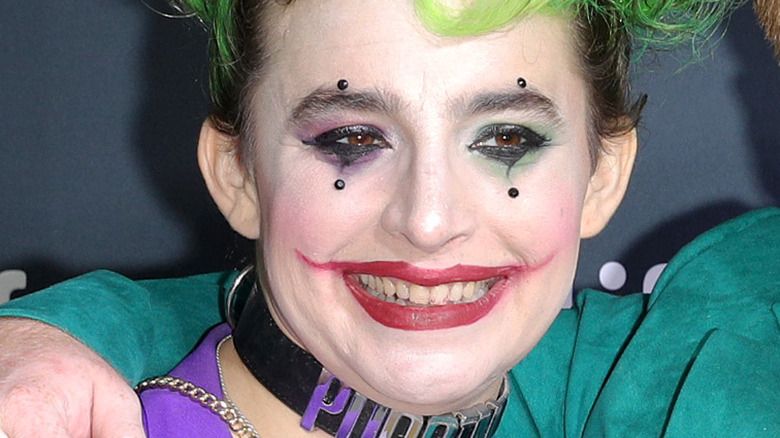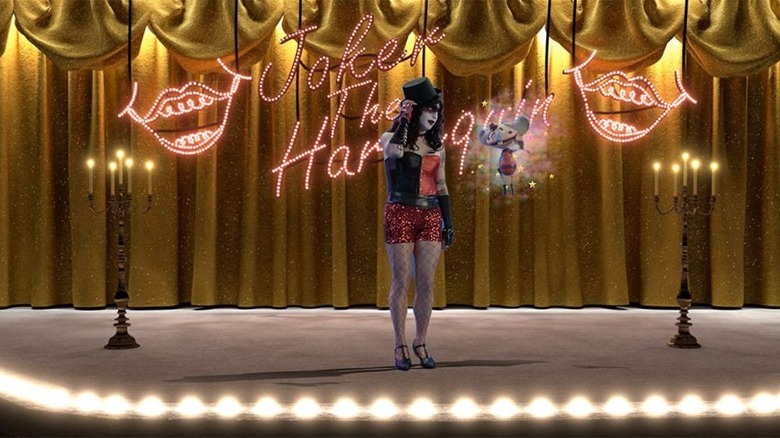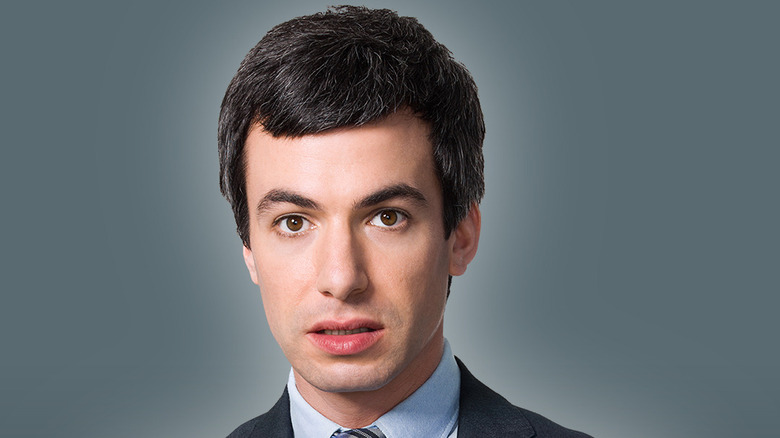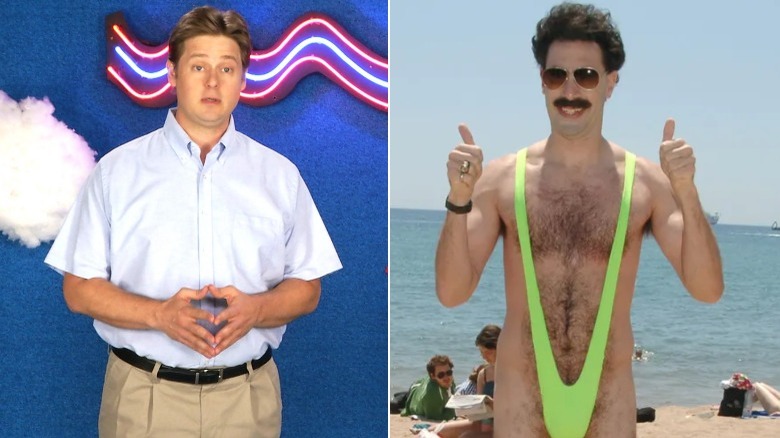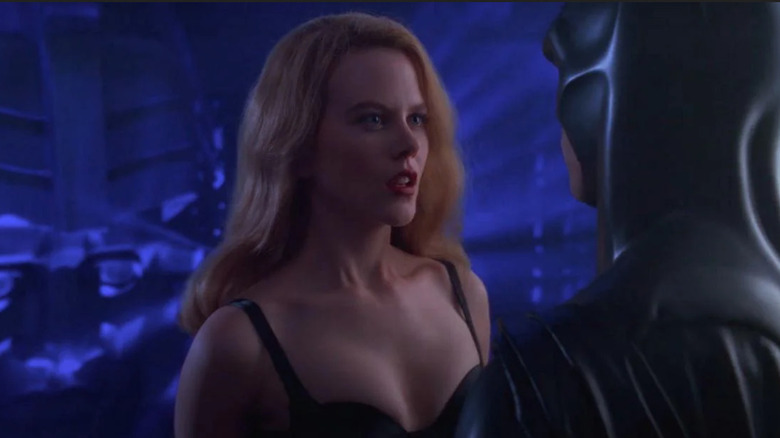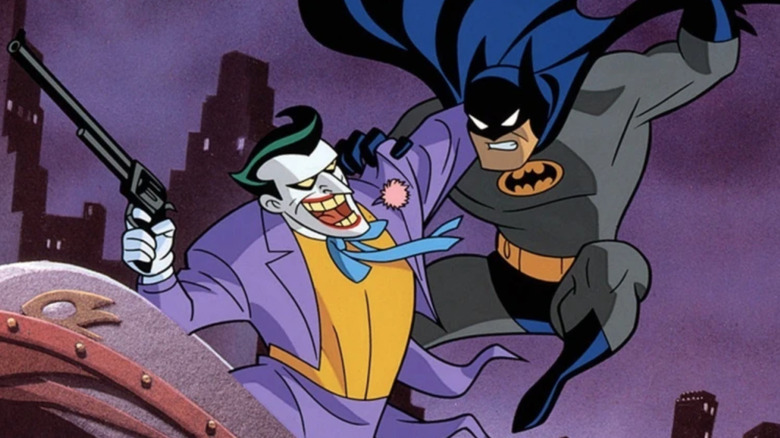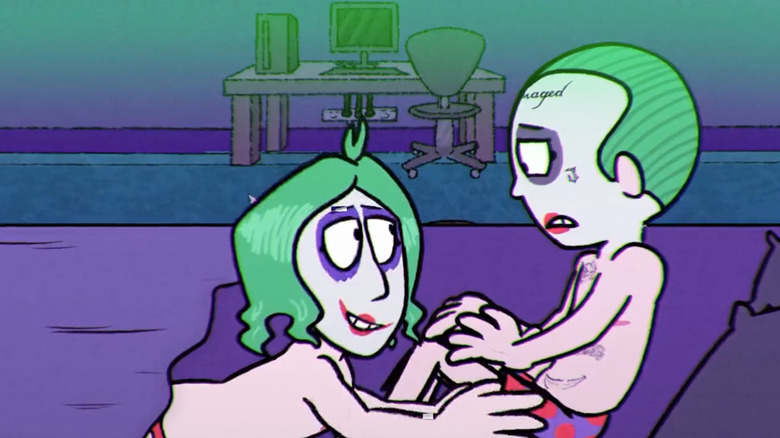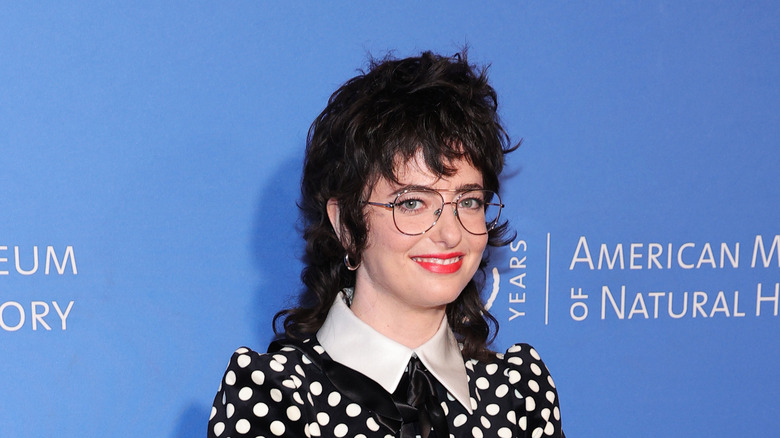Vera Drew On The People's Joker, The Movie Warner Bros Doesn't Want You To See - Exclusive Interview
This interview with Vera Drew, the director, co-writer, and star of "The People's Joker," was recorded on September 9, 2022, days before the film's premiere as part of the Toronto International Film Festival's Midnight Madness program. She had just put the finishing touches on the print (we watched an almost-finished rough cut for the purposes of this interview). The finished film, a DC Comics parody about a struggling Gotham comedian transitioning from Jokeman to Harlequin, received an incredible response at its September 13 premiere, and shortly after leaving the theater, the audience realized they might have been to the only screening of the film ever.
All subsequent screenings in Toronto were canceled due to a cease-and-desist order from Warner Bros. "The People's Joker" was obviously a risk, even being marketed as an "illegal comic book movie," but the filmmakers' legal team would seem to have a solid case that the film does fall under fair use parody laws, so this C&D order is disappointing even if not completely unexpected. The film is no longer listed as both screening and streaming in the United States as part of Fantastic Fest, and it is currently unknown if we will ever see the same cut as in Toronto, some sort of censored version, or if it's essentially banned altogether.
Whatever happens with this hilarious yet deeply personal queer coming-of-age superhero satire, we're grateful to have seen it and to have talked with Drew about its influences and unique production style.
The People's Joker came from a Patreon request
My first question is how do you build an epic multimedia project like this out of a $12 Patreon request?
That's a very good question. Luckily, I had a lot of favors I could pull. This movie really was me cashing in on every single famous favor that I could pull from working in TV over the course of the past 10 years. I've gotten to work with some of the most talented artists and animators.
When the movie went from being this more experimental found footage thing — that was definitely going to get me sued — to what it is now, which is this crazy, multimedia epic, it actually made the creative process a lot easier because I immediately was like, "This person that I know from 'Comedy Bang Bang' can go here. This person I know from working on 'Nathan for You' could help me with this." There was a lot of purely people from that world.
Thankfully, working with Tim and Eric ["Awesome Show, Great Job!"] for a number of years, I've met a lot of really talented fans who are better than anybody that I ever could have imagined working with on my first film. When we opened up the creative process, everybody wanted to get involved. Everybody didn't realize it, but they wanted a trans-Joker movie.
Nathan Fielder's impact
The special thanks credits list on this movie is huge. In particular, did Nathan Fielder have any other involvement in helping with this movie [beyond you working on "Nathan For You"]?
He might have been one of our contributors financially, but no, Nathan didn't really contribute much beyond being one of the most inspiring people I've ever met and have gotten to work with. He completely reinvented reality-based comedy in a way that working with him ... That would've been [around] 2013, because I was on "Nathan for You" Season 1.
I also worked with him on "Who is America?" [which is] Sacha Baron Cohen's show. He's always been so [inspirational], watching what he does. The thing that I really can credit him for on this project specifically, I knew would've never flirted with the idea of doing illegal comic book movies or exploring the bounds of parody law and fair use, if it weren't for Nathan. The stuff that he did with Dumb Starbucks and everything ... being able to watch his shows, let alone be a small part of the creative process on them, really informed a lot of the direction that this went.
Ra's al Ghul is Sacha Baron Cohen meets Tim Heidecker
You brought up working with Sacha Baron Cohen, and Joker in this movie has a poster on her wall for a "Borat"-esque film with Ra's al Ghul. Was this version of Ra's inspired by Cohen in any way, or is he purely actor David Leibe Hart's distinctive persona?
I got to work with Sacha Baron Cohen on "Who is America?" He's another one of those people like Nathan that broke my brain when I first saw him doing comedy. When I got the opportunity to work on "Who is America?," it was a life changing experience getting the job, because I finally felt this immense validation.
Somebody that I grew up watching — I remember seeing "Borat" in the theater when I was a kid and it being like seeing color for the first time — it completely broke my brain. It's still the funniest movie I've ever seen. The fact that this guy, who completely shaped my understanding of comedy, particularly satire and pointing out power problems, wanted to work with me was so cool.
I learned more on that show about comedy, post-production, producing and also managing a project because I was on that job for a year and a half. It took over my life. I grew up on it and almost learned more than I ever had. I don't know that he would ever identify as one of my teachers or mentors, but I did think of that experience as a very formative one. David's character, Ra's al Ghul, he's not just based off Sacha. There's definitely a lot of Sacha there, but there's a lot of Tim Heidecker in there, too.
He's also in the movie [voicing an Alex Jones-esque Perry White parody], but Tim was a boss that I had for 10 years. I came up at "Tim and Eric" and learned a lot. It's more an amalgamation of all the people that I've worked with or worked for and learned from. This idea, particularly as a trans woman, I've fallen into traps in my career at times where I need to attach myself to a particular man to make myself feel accepted in the industry and stuff.
I've been so fortunate that the mentors I've had have been really positive, very mentor-minded people like Tim or Sacha, who are intense, brilliant comedy people. They want to give younger people just starting out a chance, and [to] people like me who are clearly comedy dorks and eager to learn. They like working with people like us. That was the longest answer ever.
Batman Forever was Vera Drew's trans awakening
This next question might be a shorter answer. Was Nicole Kidman in "Batman Forever" also your trans awakening?
Yes. It didn't happen until I started the project that I had this memory flood back to me of going to see "Batman Forever" ... In "The People's Joker," it's the young Joker and her mom. In reality, for me, it was with my dad and my uncle Chaz, which was way more awkward than it would've been with my mom.
When the scene started and it's specifically the scene where Nicole Kidman's in bed, she's covering herself up and she's set up a date with Batman, because her character is into bats or whatever, and he comes to her window and I remember being a kid sitting there and I don't know at that point that it even felt like a trans awakening. It felt like I was seeing myself for the first time in movies or something.
I had this instant feeling of, "Wow, okay, I want to exude that amount of confidence and beauty and I want somebody, preferably Batman, to look at me the way that he's looking at her." It was very confusing for somebody like me, who was told, most of her life, she was a boy, to have this realization, because I also was already obsessed with Batman. When I started making this project and the idea for, "What's the thing that starts to make Joker's egg crack?" That memory flooded back to me and it was like, "Of course Batman is deeply ingrained in my queerness and that needs to be this."
Vera Drew's favorite official Jokers
What's your favorite version of the Joker?
I really loved Todd Phillips' "Joker." I don't want anybody to think that I made this movie to dunk on his or anything. I wouldn't say Joaquin was my favorite Joker, but it was my favorite portrayal of the character and the places you could take this idea of somebody who's not only an agent of chaos and violence and destruction of capitalism and every institution imaginable. It has a story that I relate to as somebody who has dealt with mental illness and has been poor, has felt the power structures that keep people like me down. It [spoke] to me.
As far as portrayals go, I love Mark Hamill's Joker. He probably is the real "people's Joker," if we're going to really think about it. When we're all thinking of Joker, we're usually thinking of his voice.
Have you been keeping up with the "Harley Quinn" series? It's pretty cool that we have multiple explicitly queer Batman, super villain/anti-hero comedies this year.
That was why I avoided it. I saw the pilot and was like, "This is amazing," but I had just started making the movie and I was like, "I don't want this to influence me." I'm going to binge it once I'm back in LA. I know they all love what we're doing, though. Not to brag or anything, but I've heard and I won't name names, but I've heard rumblings that the "Harley Quinn" writers' room loves our trans Joker movie.
Mixed media madness
The mix of styles in this film reminds me a lot of various re-animated collaborations on YouTube, except this is an original parody as opposed to a remake. How do you handle directing so many artists with such different styles remotely?
The hardest part of this job was managing all of the talented people that were working on it. I thought when I opened things up creatively that it was going to actually make my job a lot easier and that I was going to not necessarily delegate or anything, because I really like collaborating.
I really love working with somebody like Tucker Wooley, who worked on the movie. Tucker animated a really beautiful and sweet love scene between Joker and her boyfriend, Mr. J, that I would never have been able to make. That's what it looked like in my head, but I would've never been able to physically make that on my own. That was a really ideal collaboration because ... Tucker had read the script, and I gave my thoughts. What came back was this beautiful thing that I couldn't have fathomed being as cute and touching and sweet.
It was an exercise and I had to figure out what my vision was and what my direction was very clearly, and then I would go off and tell these people that were working with me what I envisioned. Hopefully, they could fill in the gaps and bring what they were picturing for this.
I did want it to feel like a collaborative movie. Part of what the movie does is assault you with images. You're bombarded with — every frame has six different jokes going on at once, which was something I did, to be honest. Speaking of mentors and stuff, I was always told one joke at a time. That was always a note I would get as an editor: "You're packing too many jokes into one shot."
[With] this movie, I wanted to completely break that rule and assault people with images. Part of that was, we had my friend Mariana made these animations of Tim Heidecker as this Alex Jones character. Those feel very distinct from our other new segments, with the Progressive Wow people, the Clark and Lois [segments]. I wanted to feel like we were pulling from different sources. That's where the mixed media thing came in.
Sarah Sherman, SNL, and sequels
Did Sarah Sherman perform her part before or after she joined "SNL"? I'm curious how Lorne Michaels is going to feel about it.
When we started writing the script, I knew right away that I wanted Lorne Michaels to be one of the primary villains in this. In Batman movies, it's important to have ... I've seen criticisms of the Schumacher "Batmans," which I love, that they have too many villains. To me, Batman's great, but it really is about the villains.
We really needed a big baddie for this. It was a no brainer when Bri LeRose, my co-writer, and I got the idea to put Lorne in it. Who's better than a comedy warlord for a "Joker" movie? He is part of the problem. "SNL" decides elections, it gets us into wars, it keeps us in wars. It keeps us in this perpetual state of, "Socialism's weird, right?" and meanwhile, nobody in America has healthcare or anything.
He felt like he was fair game and I don't remember how we got the idea to ask Sarah. I don't remember when we recorded with her, because these past few years are such a blur. I know Bri came to me and said, "We need to ask Sarah Squirm to voice Lorne Michaels, and she needs to do a Long Island accent. She needs to sound nothing like him." We asked her and Sarah did it and she crushed it. When I watch the movie, it breaks my brain knowing Sarah is in this. I'm really glad we got to get her in there.
As with any proper superhero movie, "The People's Joker" ends with a sequel tease. Was this the joke or was a follow-up already in the works?
When I was writing this movie, ideas have not stopped coming for this world we played in. There are at least two other installments of this universe that I want to visit, eventually.
There's a lot about the cyber war. I assume that could be a prequel?
I have a sequel idea. It's really good. It's probably more likely to get me sued than this one was, but that will explore a lot of the lore stuff that we see happening in the background of this first one like the cyber war, why half of America's now mutated, and also going more deeper into Joker's mom and the ancestral trauma there.
That's all I'll really say about it, because you got to watch the movie to find out what the next sequel or what the sequel will be. It is another big IP that I do not own that we're trying to bring in and that it will be another iconic genre character front and center, portrayed by a trans person.
"The People's Joker" premiered during the Toronto International Film Festival. Future screenings have been cancelled due to "rights issues."
This interview has been edited for clarity.
